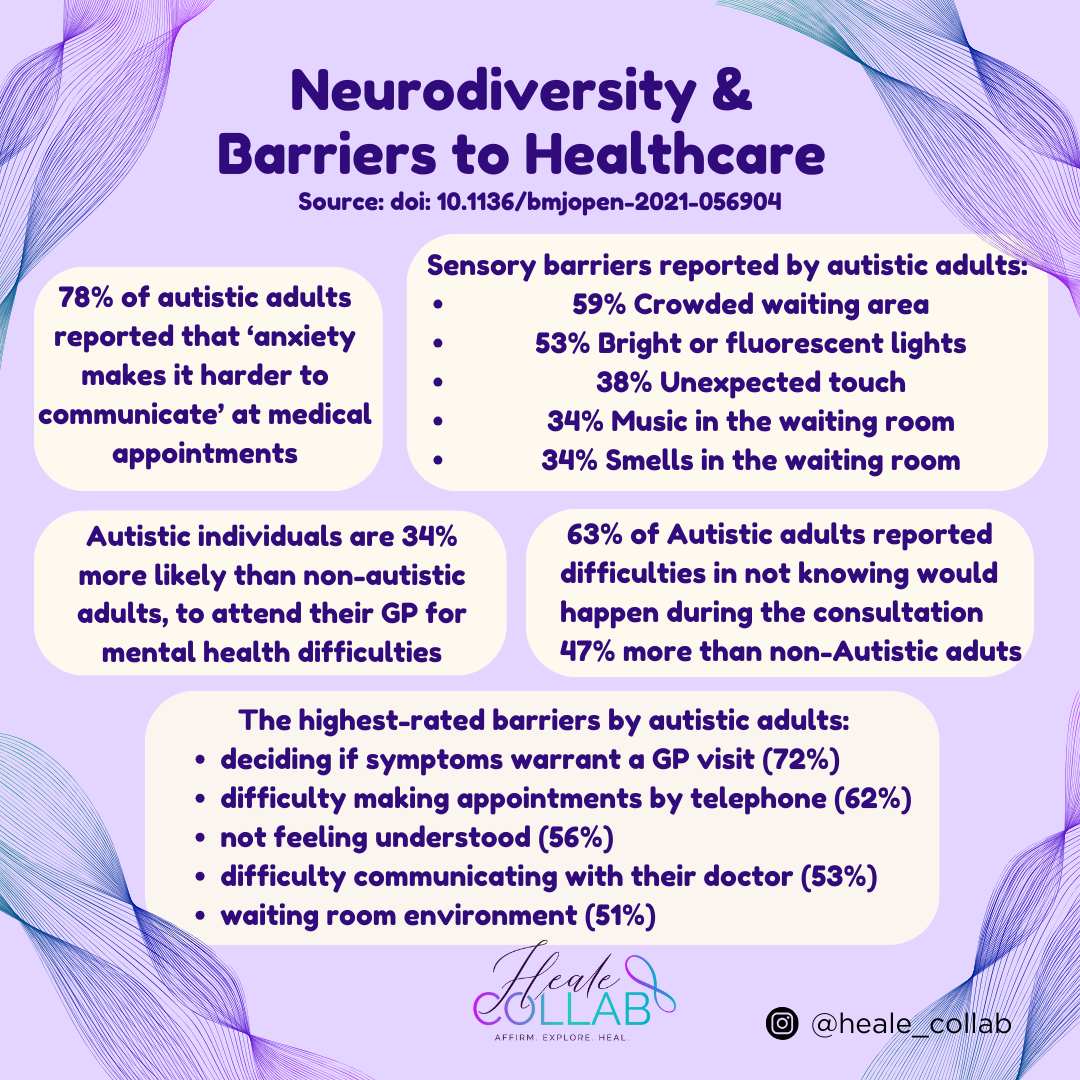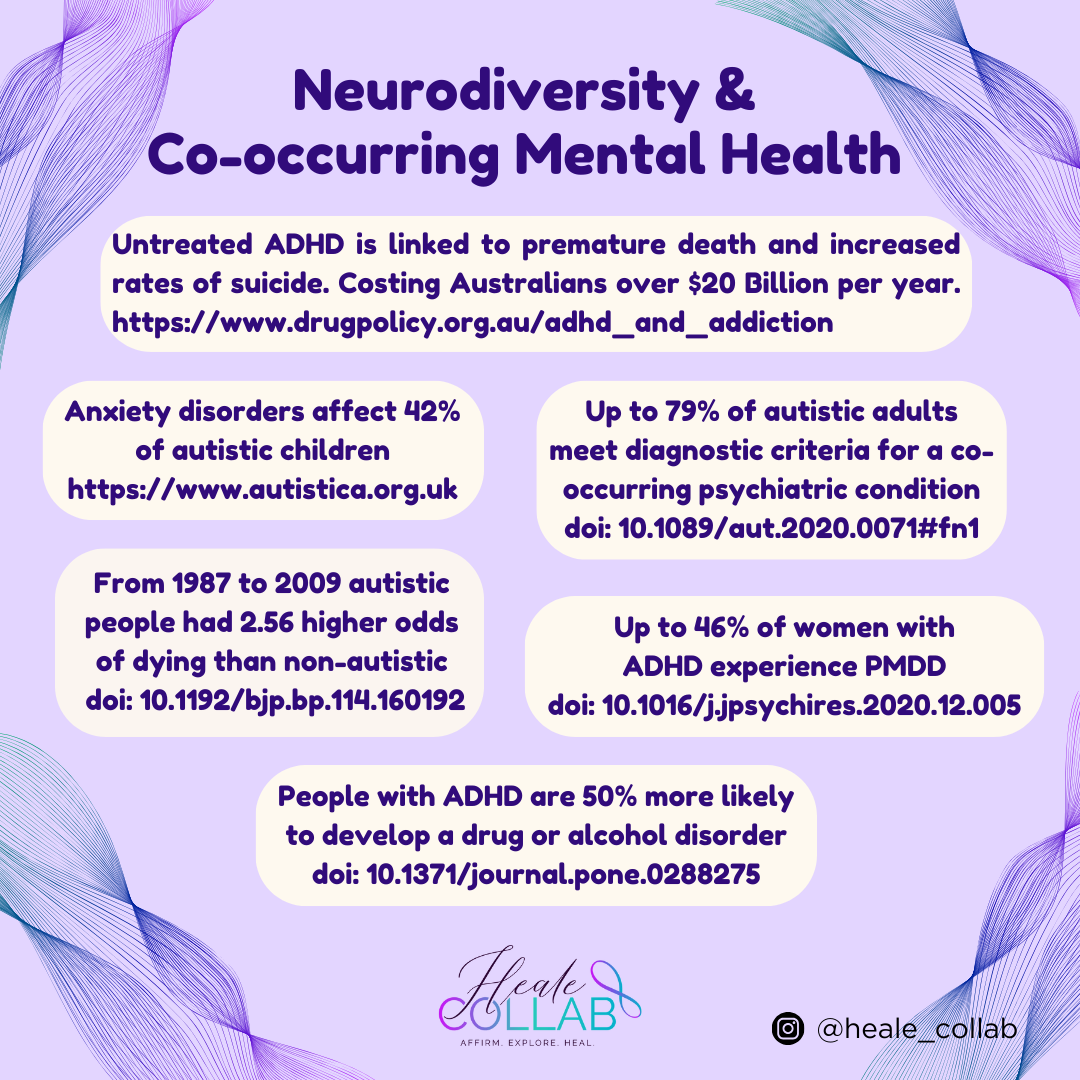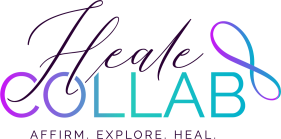Health & Mental Health
Emerging research suggests that Neurodivergent individuals commonly experience co-occurring more mental health & physical health conditions than the general population. This research has also found that it can be more difficult for Neurodivergent individuals to access the healthcare they require, which results in negative health outcomes. For more information please refer to my article ‘Co-occurring Conditions, Misdiagnosis & Barriers to Healthcare: The Reality for Neurodivergent Individuals.’
These collated resources may be of assistance in accessing appropriate support and advocating for yourself or your loved one.
MENTAL HEALTH
Eating Disorders Neurodiversity Australia
Focused on building neurodiversity-affirming, accessible, and inclusive eating disorder healthcare. A not-for-profit organisation whose members are neurodivergent (autism, ADHD, dyslexia, dyspraxia, synesthesia, giftedness, dyscalculia) with lived or living experience of an eating disorder.
Here to help you connect with better mental health information and approaches for infants, children and families.
Helps all Australians access the mental health and wellbeing services that are right for them. It makes it easier to navigate and choose the most suitable care options, whether that’s face-to-face, via phone, or online.
Aiming to create and foster worldwide mental health awareness within the video game industry. An engaging and evolving worldwide hub for information, news, features, videos, and support related to all facets of mental health in the video game industry. Including stories of key figures who have fought their own personal battles with mental illness and a range of games that were created to challenge how we think about mental health as well as help gamers cope with or understand their own mental health journey.
Australia’s leading national addiction treatment, education and research centre. Turning Point seeks to transform the way society provides treatment, specialist care and support for those affected by addiction.
HEALTH
Self Advocacy in Healthcare: A toolkit
Self advocacy in healthcare is a dual-read guide for LGBTIQA+ autistic people and their supporters. It guides people through the use of the personal infocards, and offers guidance for completing the cards. The guide includes information specifically for healthcare professionals, providing additional information and resources about the healthcare needs of autistic people.
Autistic and/or ADHD adults often have a grouping of medical problems in many body systems. For many people, these medical conditions are related to one another. It may be hard to convey these connections during short healthcare appointments, this project offers resources to help you discuss this with your clinician.
Resources for Autistic Adults and their Health Care Providers. The resources on this site are meant to improve the healthcare of autistic adults. They were made by the Academic-Autistic Spectrum Partnership in Research and Education (AASPIRE) through a series of research studies funded by the National Institute of Mental Health.
Autism is not an illness but it is important for autistic people to look after their physical health like anyone else. Certain elements of physical wellbeing may pose specific challenges for autistic people; for example, when illnesses or treatments interact with sensory sensitivities or communication preferences are not accommodated by health professionals. Here is advice and guidance on a range of health care topics.

Statistics from recent research exploring Neurodivergence and the barriers to accessing healthcare

Statistics from recent research exploring Neurodivergence and co-occurring mental health conditions.
Acknowledgment of Country
Heale Collab acknowledges the Bunurong people of the Kulin Nation who are the Traditional Owners of the lands on which we work and learn. The Bunurong people always have and always will belong to the Werribee Yalook (river), stars, hills and red clay of this Country. We recognise their continued connection and role caring for Country over thousands of generations. We pay respect to their Elders past and present who continue to preserve and protect Country, culture and community.
